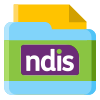The data collection process is an important part of the case management processes. Data can be collected for many numerous reasons, the main reasons are that the information collected informs specialists on what is happening for the client and also when they implement a treatment or intervention it measures what is working for the client and what isn’t.
This information then informs the specialist on how to best provide treatment for the client. But another very important aspect of data collection is it provides an excellent source of information that can be used as evidence to support a claim under a client’s NDIS Plan.
For example: if a client with epilepsy was asking for funding for a sensor pad that detects seizures that occur when the client is sleeping at night. (This pad will alert family members the client is having a seizure.) Then if the data collection process shows the client has seizures a lot at night then this information can assist the client is getting the funding for the sensor pad as it shows that there is a need for it.

The data collection process is an important part of the case management processes. Data can be collected for many numerous reasons, the main reasons are that the information collected informs specialists on what is happening for the client and also when they implement a treatment or intervention it measures what is working for the client and what isn’t.

This information then informs the specialist on how to best provide treatment for the client. But another very important aspect of data collection is it provides an excellent source of information that can be used as evidence to support a claim under a client’s NDIS Plan.
For example: if a client with epilepsy was asking for funding for a sensor pad that detects seizures that occur when the client is sleeping at night. (This pad will alert family members the client is having a seizure.) Then if the data collection process shows the client has seizures a lot at night then this information can assist the client is getting the funding for the sensor pad as it shows that there is a need for it.

Below are some examples of possible data collection sheets that a client may require. We can however customize any data collection charts to collect the required information needed:

Below are some examples of possible data collection sheets that a client may require. We can however customize any data collection charts to collect the required information needed:
We can assist you with all your case management needs and can help you maxmize your funding you receive from your NDIS Plan

In the event of a medical emergency a client’s care plans and case management form an excellent resource for medical staff to treat a client. The care plans outline what care a client is currently receiving and a client’s medical history.

Plans document what treatments have been implemented for a client both their current interventions as well as past interventions. This assists medical and other specialists in determining a treatment plan for the client. It informs them on what worked for the client previously and what has not worked.

By having the client’s care requirements documented it also provides the information to medical and other specialists on the other treatments a client may be receiving from another specialist. This means that all specialists are working collaboratively to provide the best quality of care for the client.

The care plans and data collection process are an excellent source of information that can be provided as supporting evidence for a claim under a client’s NDIS Plan.

It outlines the client’s current care requirements. It informs care staff on what conditions the client has and how they need to manage the client’s care.
